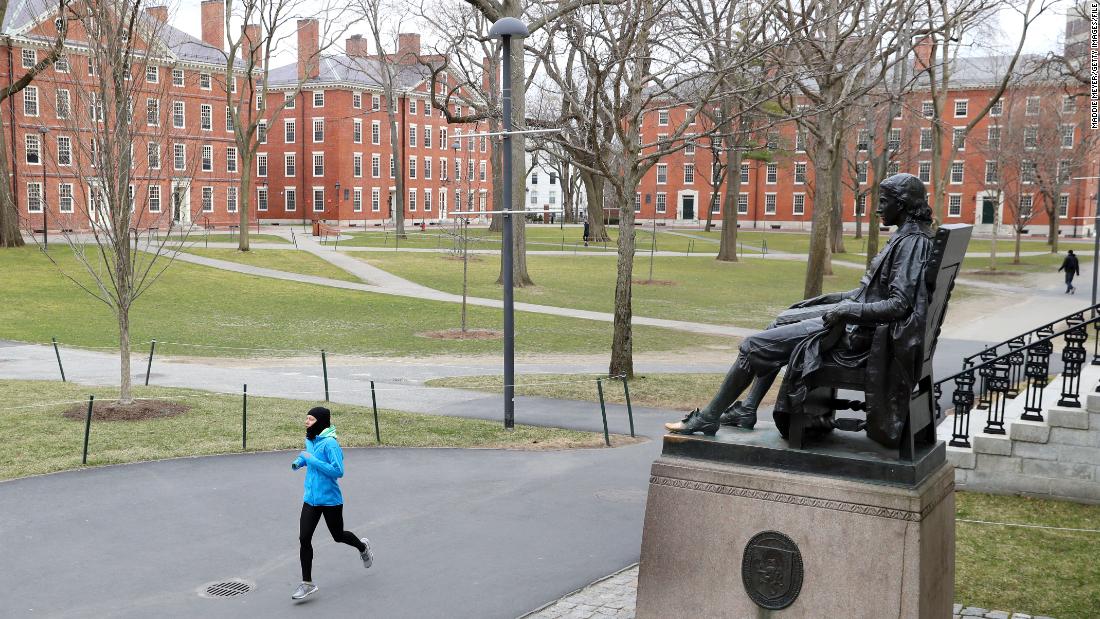Students could not graduate due to pandemic 2:49
(CNN) - International students seeking degrees in the United States will have to leave the country or risk deportation if their universities switch to teaching only online, the Immigration and Customs Enforcement Service (ICE, announced Monday by its acronym in English).
The measure may affect thousands of foreign students who come to the United States to attend universities or participate in training programs, as well as in non-academic or vocational studies.
Universities across the country are beginning to make the decision to transition to online courses as a result of the coronavirus pandemic. At Harvard, for example, all course instruction will be delivered online, even for students who live on campus. For international students, that opens the door for them to have to leave the United States.
"There is so much uncertainty. It's very frustrating, ”said Valeria Mendiola, 26, a graduate student at the Harvard Kennedy School of Government. "If I have to go back to Mexico, I can go back, but many international students just can't."
In a press release Monday, ICE said students who fall under certain visas "cannot take a full load of online courses and stay in the United States," adding: "The United States Department of State will not issue visas. Students enrolled in schools and / or programs that are completely online during the fall semester will not be allowed by US Customs and Border Protection to enter the United States. ”
The agency suggested that students currently enrolled in the United States consider other measures, such as transferring to schools with in-person classes. There is an exception for universities that use a hybrid model, such as a combination of online and classroom classes.
Brad Farnsworth, vice president of the American Board of Education, said the announcement surprised him and many others.
"We believe this will create more confusion and more uncertainty," said Farnsworth, whose organization represents about 1,800 colleges and universities. "What we expected to see was a greater appreciation for all the different possible nuances that campuses will explore."
One concern with the new guidance, Farnsworth said, is what would happen if the public health situation deteriorated in the fall and the universities that had been offering in-person classes felt they had to switch to taking all courses online to stay safe. .
LOOK : These are the economic risks the US would face if visa restrictions were maintained
Visa requirements for students have always been strict and entering the US to take only online courses has been prohibited.
"These are not some garage universities, they are not scams, they are legitimate universities that would normally have in-person curricula if it weren't for the coronavirus," said Theresa Cardinal Brown, director of immigration and cross-border policy at the Center for Two-Party Policy.
"The most important problem is that some of these countries have travel restrictions and cannot go home, so what do they do then?" He added. "It is an enigma for many students."
Harvard University President Larry Bacow said in a statement Monday night, "We are deeply concerned that the guidance issued today by the United States Immigration and Customs Enforcement Service imposes a strong and unique approach. for a complex problem for international students, particularly those in online programs, and it gives them few options beyond leaving the country or changing universities. "
The guidance, Bacow continued, "undermines the thoughtful approach taken on behalf of students by many institutions, including Harvard, to plan for ongoing academic programs while balancing the health and safety challenges of the global pandemic."
"We will work closely with other schools and universities across the country to chart a path forward," he said.
The Trump administration has made a litany of changes to the U.S. immigration system, based on the coronavirus pandemic, which has resulted in preventing groups of immigrants from reaching the country.
Last month, the White House issued an immigration proclamation that drastically restricted legal immigration to the U.S. leaving hundreds of people and companies in a fight to understand whether their future plans have been derailed.
In the proclamation, the Government argued that the "extraordinary circumstances" raised by the coronavirus required the suspension of employment-based visas. But immigrant advocates, industries, and experts say the administration is taking advantage of the pandemic to make radical immigration changes and advance its agenda to reduce legal immigration.
READ : Trump administration's blow to legal immigration leaves thousands of lives in limbo
Monday's announcement, like the changes that preceded it, could result in many foreign students who often pay high tuition having to return to their home country.
According to the Migration Policy Institute, a Washington-based group of experts, around 1.2 million students who would be among the affected visas were enrolled and registered in more than 8,700 schools across the country as of March 2018. .
Farnsworth said he sees the announcement as part of a broader pattern of management measures that "have not set the right tone."
"I think this is going to create more anxiety among international students and those who are still thinking about where they are going in the fall, I think this can push them to go to college in another country," he said.
While students may have the option of transferring to a school or university that offers in-person courses, it can be difficult to accomplish amid continuing concerns about the coronavirus. Some schools have announced plans to bring students back but shorten semesters, as well as cancel almost all in-person classes during the semester.
students

